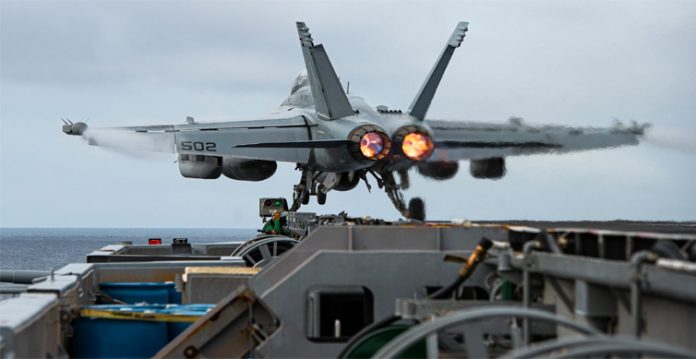South Korea, the US, and Japan kicked off a trilateral naval exercise, involving an American aircraft carrier, in waters south of the Korean Peninsula, amid joint efforts to reinforce deterrence against growing North Korean threats, Seoul’s Defence Ministry said.
The two-day anti-submarine and search-and-rescue exercise, featuring the USS Nimitz carrier, got underway in the international waters south of the southern island of Jeju, reports Yonhap News Agency.
The joint maneuvers followed Pyongyang’s provocative acts, such as its unveiling of the Hwasan-31 tactical nuclear warhead last week and the test of the underwater nuclear attack drone Haeil days earlier.
Also Read: Philippines, US Hold Joint Military Drills
“(The anti-submarine exercise) was arranged to enhance response capabilities of South Korea, the US, and Japan against North Korea’s advancing underwater threats, including from a submarine-launched ballistic missile,” the Ministry said in a statement.
The South deployed to the exercise its key destroyers, the Yulgok YiYi, Choe Yeong and Daejoyeong, as well as the Soyang combat support ship, while the US sent the carrier and two destroyers, USS Wayne E. Meyer and USS Decatur.
Japan mobilized the JS Umigiri destroyer. The anti-submarine drills will focus on enhancing the countries’ capabilities to “detect, track, share information on and defeat” the North’s underwater threats, according to the Ministry.
During the search and rescue segment, they plan to practice first-aid and other emergency procedures for those in a simulated maritime accident.
The three countries last held trilateral anti-submarine drills last September.
This week’s search-and-rescue drills among the three nations took place for the first time in seven years, according to the Ministry.
USS Nimitz, a centerpiece of the US naval power, trained bilaterally with the South Korean Navy on March 27 and made a port call in Busan, 325 km southeast of Seoul, the following day.
This week’s training highlighted tightening security cooperation among the US and its two Asian allies, which have seen their ties thaw in the wake of Seoul’s solution to the thorny issue of compensation for victims of wartime forced labor.
(This story has been sourced from a third-party syndicated feed, agencies. Raavi Media accepts no responsibility or liability for the dependability, trustworthiness, reliability, and data of the text. Raavi Media managementythisnews.com reserves the sole right to alter, delete or remove (without notice) the content at its absolute discretion for any reason whatsoever.)


